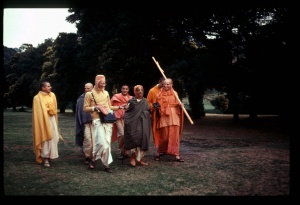SB 2.3.14

A.C. Bhaktivedanta Swami Prabhupada
TEXT 14
- etac chuśrūṣatāṁ vidvan
- sūta no 'rhasi bhāṣitum
- kathā hari-kathodarkāḥ
- satāṁ syuḥ sadasi dhruvam
SYNONYMS
etat — this; śuśrūṣatām — of those eager to hear; vidvan — O learned; sūta — Sūta Gosvāmī; naḥ — unto us; arhasi — may you do it; bhāṣitum — just to explain it; kathāḥ — topics; hari-kathā-udarkāḥ — result in the topics of the Lord; satām — of the devotees; syuḥ — may be; sadasi — in the assembly of; dhruvam — certainly.
TRANSLATION
O learned Sūta Gosvāmī! Please continue to explain such topics to us because we are all eager to hear. Besides that, topics which result in the discussion of the Lord Hari should certainly be discussed in the assembly of devotees.
PURPORT
As we have already quoted above from the Bhakti-rasāmṛta-sindhu of Rūpa Gosvāmī, even mundane things, if dovetailed in the service of the Lord Śrī Kṛṣṇa, are accepted as transcendental. For example, the epics or the histories of Rāmāyaṇa and Mahābhārata, which are specifically recommended for the less intelligent classes (women, śūdras and unworthy sons of the higher castes), are also accepted as Vedic literature because they are compiled in connection with the activities of the Lord. Mahābhārata is accepted as the fifth division of the Vedas after its first four divisions, namely Sāma, Yajur, Ṛg and Atharva. The less intelligent do not accept Mahābhārata as part of the Vedas, but great sages and authorities accept it as the fifth division of the Vedas. Bhagavad-gītā is also part of the Mahābhārata, and it is full of the Lord's instruction for the less intelligent class of men. Some less intelligent men say that Bhagavad-gītā is not meant for householders, but such foolish men forget that Bhagavad-gītā was explained to Arjuna, a gṛhastha (family man), and spoken by the Lord in His role as a gṛhastha. So Bhagavad-gītā, although containing the high philosophy of the Vedic wisdom, is for the beginners in the transcendental science, and Śrīmad-Bhāgavatam is for graduates and postgraduates in the transcendental science. Therefore literatures like Mahābhārata, the, purāṇas and similar other literatures which are full of the pastimes of the Lord, are all transcendental literatures, and they should be discussed with full confidence in the society of great devotees.
The difficulty is that such literatures, when discussed by professional men, appear to be mundane literature like histories or epics because there are so many historical facts and figures. It is said here, therefore, that such literatures should be discussed in the assembly of devotees. Unless they are discussed by devotees, such literatures cannot be relished by the higher class of men. So the conclusion is that the Lord is not impersonal in the ultimate issue. He is the Supreme Person, and He has His different activities. He is the leader of all living entities, and He descends at His will and by His personal energy to reclaim the fallen souls. Thus He plays exactly like the social, political or religious leaders. Because such roles ultimately culminate in the discussion of topics of the Lord, all such preliminary topics are also transcendental. That is the way of spiritualizing the civic activities of human society. Men have inclinations for studying history and many other mundane literatures—stories, fiction, dramas, magazines, newspapers, etc.—so let them be dovetailed with the transcendental service of the Lord, and all of them will turn to the topics relished by all devotees. The propaganda that the Lord is impersonal, that He has no activity and that He is a dumb stone without any name and form has encouraged people to become godless, faithless demons, and the more they deviate from the transcendental activities of the Lord, the more they become accustomed to mundane activities that only clear their path to hell instead of return them home, back to Godhead.* Śrīmad-Bhāgavatam begins from the history of the Pāṇḍavas (with necessary politics and social activities), and yet Śrīmad-Bhāgavatam is said to be the Pāramahaṁsa-saṁhitā, or the Vedic literature meant for the topmost transcendentalist, and it describes paraṁ jñānam, the highest transcendental knowledge. pure devotees of the Lord are all paramahaṁsas, and they are like the swans, who know the art of sucking milk out of a mixture of milk and water.
Footnote
* Even fifty years ago, the social structure of all Indians was so arranged that they would not read any literature that was not connected with the activities of the Lord. They would not play any drama not connected with the Lord. They would not organize a fair or ceremony not connected with the Lord. Nor would they visit a place that was not holy and sanctified by the pastimes of the Lord. Therefore even the common man in the village would talk about Rāmāyaṇa and Mahābhārata, Gītā and Bhāgavatam, even from his very childhood. But by the influence of the age of Kali, they have been dragged to the civilization of the dogs and hogs, laboring for bread without any sense of transcendental knowledge.